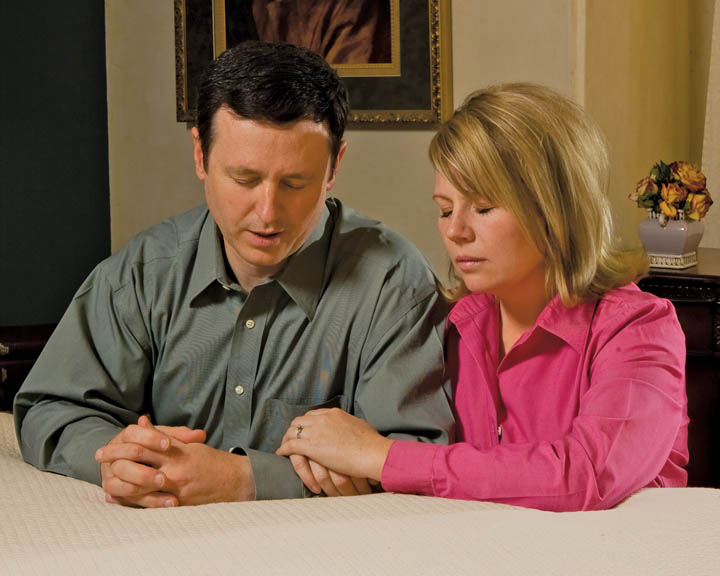Excerpts from: Marital Commitment Among Religious Couples
The Threefold Cord: Marital Commitment in Religious Couples
By Nathaniel M. Lambert, Florida State University
David C. Dollahite, Brigham Young University
Co uples expressed the belief that their marital commitment was stronger when God was included as the “third cord” in the marriage. Amy, an Orthodox Christian banker said, “Two cords become united with a third cord and you are strengthened with that third cord there. I think what comes for the religion in strengthening the marriage is that there’ll be ups and downs but you know you’re going to get through it.” Believing that God was part of her marriage as a “third cord” seemed to give Amy the strength to remain committed to her spouse through the ups and downs of their marriage.
uples expressed the belief that their marital commitment was stronger when God was included as the “third cord” in the marriage. Amy, an Orthodox Christian banker said, “Two cords become united with a third cord and you are strengthened with that third cord there. I think what comes for the religion in strengthening the marriage is that there’ll be ups and downs but you know you’re going to get through it.” Believing that God was part of her marriage as a “third cord” seemed to give Amy the strength to remain committed to her spouse through the ups and downs of their marriage.
God and the genesis of marriage. Many of the couples said they believed that God “brought us together” in the first place, that is they believed God was directly involved in them meeting and marrying their spouse. This increased their commi
tment to the marriage partner and the marriage. When discussing commitment, several of the couples we interviewed referred to the initial vows that they made to each other during their wedding ceremony. These vows seemed to have lasting significance in their lives and were mentioned as helping these couples to maintain high levels of marital commitment due to the additional impact of including God in the marital covenant. Their vows reminded them of feeling God’s presence or approval during the wedding ceremony, which contributed to the long-lasting memory of the vows.
Many of the couples interviewed perceived their wedding vows as uniting themselves to each other and to God. Thomas, a Presbyterian financial analyst, said “I believe it is a covenant. It’s a three-way covenant between us and God and we believe that we’re one, we’re one flesh, we’re one in union.” Becoming one with God seemed to carry great importance for the couples. In explaining the significance of her marital vows, Kira, a Lutheran insurance broker, expressed thoughts related to the threefold cord metaphor. “It’s a covenant. It’s a covenant to each other, but more importantly it’s a covenant to God. It’s a threesome that holds together. You take that third out and it falls apart. So that’s I think what for us has really defined our marriage.” Kira’s commitment seems to have been influenced by including God in her marital vows and covenants. This idea of including God in the marital vows is one characteristic that differentiates religious ceremonies from secular weddings, and appears to be a defining feature of religious couples’ marital commitment.
Susan, a Methodist chemistry professor, described her experience of feeling God’s presence during their wedding ceremony. “It was so different than what we had imagined. It was so incredibly powerful. . . . And it was just the love that was there. And whatever transformation happened in the church was really, I think, a feeling of God’s presence.” This “powerful” experience seemed to leave a lasting impact on how Susan viewed her marriage.
Regardless of whether or not making marital vows was a “transforming” experience, couples seemed to recall these vows of commitment later in their marriage. As Russell, a Catholic meat cutter, said, “the ceremony, it’s [always] in the back of your mind having made that commitment.” Always having the wedding vows at the back of his mind seemed to help Russell and others to remain committed in marriage. Whether it be believing that God brought them together, the impact of including God in the marital vows and covenants, the influence of experiencing God’s presence during the wedding ceremony, or simply always remembering the promises made during the ceremony, including God in the genesis of marriage seemed to enhance couples’ marital commitment.
Ongoing partnership with God. Couples’ perception of God’s involvement in their marriage goes far beyond their wedding ceremony. Shawn, a Baptist university chaplain, said, “God is the center of our marriage. We desire that God would be the center of our marriage, so that our commitment to each other is an outgrowth of our commitment to Him. . . . Faithfulness, fidelity, commitment, perseverance, covenant. Our faith definitely influences those.” Shawn felt like keeping God at the center of his marriage enhanced his commitment to his wife.
Mercy, a Baptist caregiver, explained how God’s ongoing influence helped them stay together, “Well, we believe He brought us together. You know, so He played a role in the start. And I don’t think that we’d be together anymore if we didn’t have God in the middle.” Mercy acknowledged God’s important role in the initial phases of their relationship, but also asserted that without God’s continued presence their marriage would not have endured. Perhaps this may be due partly to additional motivation to be committed that can stem from a relationship with God. Ed, a Seventh-day Adventist systems analyst claimed that “Our relationship with God is our motivation to work things out.” Whatever the reason may be, including God in their marriage helped couples to stay committed to each other.
